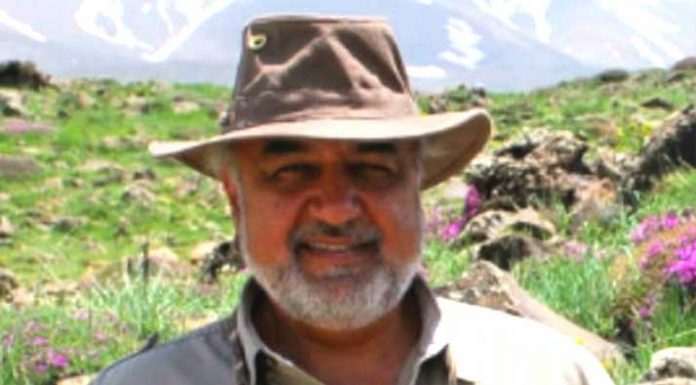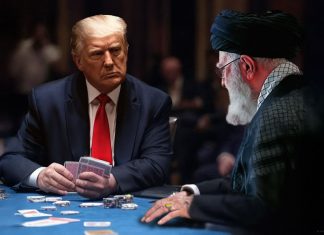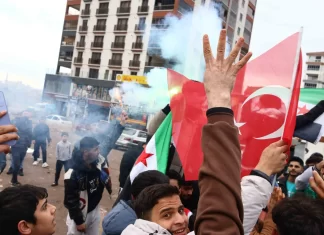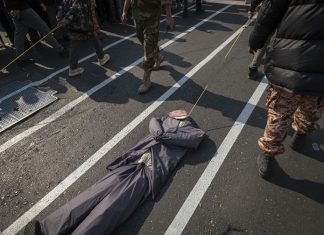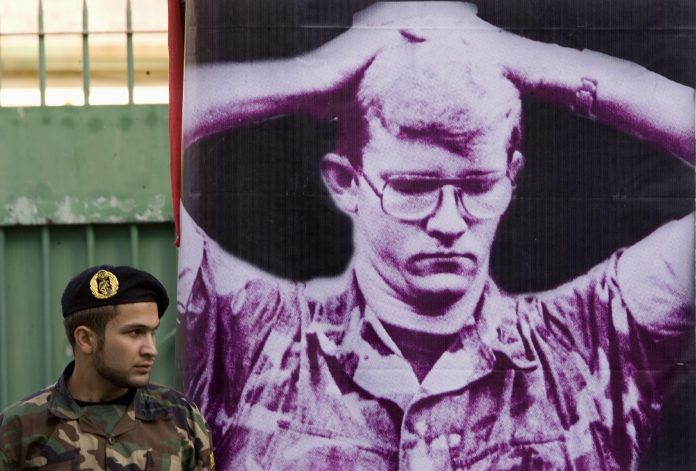
By Ahmad Rafat
Holding foreign nationals and Iranians with dual citizenship hostage, and demanding money or a prisoner swap for their freedom, has been an integral part of the Islamic Republic’s transactional foreign policy since its inception in April 1979.
In the past 43 years, Tehran’s method of choice has been to extort money from the U.S. and other Western countries to return their citizens held captive in Iranian prisons.
Iranian President Ebrahim Raisi’s Vice President for Economic Affairs Mohsen Rezaei, a former Revolutionary Guards commander who also served as the Secretary of the Expediency Council, has repeatedly said that “thousands of Americans must be taken hostage so we can get money from the U.S. for their release and solve the country’s economic problems.”
The recent release of two British-Iranian dual nationals, Nazanin Zaghari-Ratcliffe and Anousheh Ashouri, who respectively served six and five years in Iranian prisons, is an example of Iran’s practice of transacting with foreign states by taking men and women hostage.
Iran released Mr. Ashouri and Ms. Zaghari-Ratcliffe on March 17, only after the UK government reportedly settled with Tehran a debt of 400 million pounds ($528 million) for Chieftain tanks which the late Mohammad Reza Shah Pahlavi had bought before the 1979 Islamic Revolution, most of which were never delivered to Iran.
UK Parliament Is Urged to Open Inquiry Into Nazanin Zaghari-Ratcliffe’s Detention
Shortly after her arrest, Iranian authorities reportedly told Nazanin Zaghari-Ratcliffe that she could return home if the UK government were to pay its debt to Tehran.
Nazanin Zaghari-Ratcliffe and Anousheh Ashouri spent many years in prison on trumped-up charges.
Three days after Zaghari-Ratcliffe and Ashouri’s release, an 83-year-old Australian-Iranian named Shokrollah Jebeli died in Tehran’s Evin prison hospital.
Mr. Jebeli had spent two years in prison on what his family described as “false accusations of fraud” brought against him by the Iranian Ministry of Intelligence.
Prison authorities reportedly took Jebeli to a hospital briefly after he suffered a heart attack, but returned him to his cell a few hours later.
Five days before his death, Amnesty International accused Iran of subjecting Jebeli to “a type of torture by deliberately denying him adequate specialized medical care and withholding medication for his multiple serious health conditions.”
The organization called for the immediate and unconditional release of Jebeli.
Iran started using the abduction of Westerners and dual nationals as a foreign policy tool with the occupation of the U.S. Embassy in Tehran by the Muslim Student Followers of the Imam’s Line (also known as the Muslim Students of Imam Khomeini Line).
On Nov. 4, 1979, a group of university students scaled the walls of the U.S. Embassy in Tehran — in clear violation of international treaties, which offer immunity to foreign diplomats — and took 66 American Embassy workers hostage.
After a few weeks, the students released 14 hostages but held the remaining 52 for 444 days.
The students freed the remaining hostages following the Algiers Accord, brokered by the Algerian government between Iran and the U.S. on Jan. 19, 1981.
Under the agreement, the U.S. government released $8 billion of frozen Iranian assets. Iran received $3 billion of that money, and the remaining $5 billion was used to pay off its debt to American banks.
In the past few decades, the Islamic Republic has used its proxies to kidnap foreign nationals.
The Iranian-backed Hezbollah abducted some 40 American and European nationals in Lebanon in 1982 and 1983.
The group released several American hostages after President Ronald Reagan’s National Security Adviser, Robert McFarlane, visited Tehran in May 1986.
In a scandal dubbed the Iran-Contra affair (also known as the McFarlane affair), U.S. officials secretly facilitated the sale of arms to the Islamic Republic, which was under an arms embargo at the time.
The U.S. administration planned to use the proceeds from the sale of arms to Iran to fund the Contras fighting the leftist government in Nicaragua.
It was the Israelis and not the Americans who supplied the arms to Iran, which included spare parts for planes and missiles for Iranian naval carriers.
Soon after Iran received the weapons and the spare parts, Hezbollah released seven American hostages.
There have been several instances of apparent prisoner swaps between Western European countries and the Islamic Republic in the past few decades.
Former Iran Hostages Co-Found Washington-Based International NGO, Hostage Aid Worldwide
Several French nationals taken hostage in Lebanon were released soon after the French authorities freed Anis Nakkache, a Lebanese national, who was serving a prison sentence for the failed assassination attempt on Shapour Bakhtiar, the Shah’s last prime minister.
On Sept. 17, 1992, gunmen assassinated Iranian-Kurdish opposition leaders Sadegh Sharafkandi, Fattah Abdoli, Homayoun Ardalan, and their translator Nouri Dehkordi, in the Mykonos Greek restaurant in Berlin.
According to court documents in Germany, the killers had links to Iranian intelligence.
Police arrested and charged four Lebanese nationals and one Iranian, Kazem Darabi, with murder.
On April 10, 1997, the court handed life sentences to Mr. Darabi and another defendant. Two others were sentenced to 5 years and 11 years in prison.
In October 1998, Iranian authorities arrested Helmut Hofer, a 56-year-old business person, and charged him with being in an unlawful sexual relationship with an Iranian woman.
Mr. Hofer was initially sentenced to death but eventually released in January 2000 and allowed to return to Germany.
In 2005, Donald Klein, a 53-year-old German national, was given an 18-month prison sentence for illegally entering Iran. Iran eventually released him in 2007.
Many believe that there was a direct link between Iran freeing Hofer and Mr. Klein and the release of Kazem Darabi and three Lebanese men involved in the Mykonos Restaurant assassinations from German prisons in December 2007.
The Islamic Republic has continued to take many foreigners and Iranians with dual citizenship hostage in the past two decades.
While some have secured their release by paying large sums of ransom money — which Iran describes as posting legal bail — others have been part of a prisoner exchange, resulting in the release of Iranian citizens in Western prisons who have been convicted of circumventing sanctions or committing terrorist acts.
Haleh Esfandiari, an Iranian-American academic and former director of the Middle East Program at the Woodrow Wilson International Center for Scholars in Washington, D.C., was held in Tehran’s Evin prison from May 8 to Aug. 21, 2007, and released only after posting a $333,000 bail.
Clotilde Reiss, a French citizen, was arrested during the protests after the 2009 Iranian presidential elections.
Ms. Reiss, who holds a master’s from Sciences-Po Lille, spent nine months in an Iranian prison. She was eventually released after posting a $280,00 bail.
Reiss’s return to Paris coincided with the French authorities releasing Majid Kakavand, an Iranian engineer accused of buying weapons for the Islamic Republic in violation of the U.S. sanctions.
The U.S. had sought the extradition of Mr. Kakavand, but French authorities allowed him to return to Iran.
In July 2009, Iranian border guards arrested an American journalist, Shane Bauer, and his companions Joshua Fattal and Sarah Shourd, who had reportedly entered Iran accidentally while hiking in northern Iraq near the Iranian border.
Iranian authorities charged the three with espionage and held them in Tehran’s Evin prison.
On Sept. 14, 2020, Iran released Ms. Shourd into the care of the Omani government, but only after she had posted a $500,000 bail.
Iranian authorities released Mr. Bauer and Mr. Fattal seven days later after each paid a $465,000 bail.
Iran Takes Dual Nationals Hostage to Get Money from West, Says Nobel Winner Ebadi
In January 2016, Iranian authorities released four Iranian-American dual nationals in a prisoner exchange with the U.S.
They were Jason Rezaian, Tehranr Bureau Chief for the Washington Post; Amir Mirza Hekmati, a former U.S. marine accused of spying for the CIA; Saeed Abedini, a Christian pastor; and Nosratollah Khosravi-Roodsari.
As part of the same deal, former U.S. President Barack Obama’s administration released $1.7 billion in frozen Iranian funds. The cash was loaded onto a plane that landed in Tehran before hostages were released.
The U.S. also freed seven Iranian citizens and American-Iranian dual nationals who had been jailed for circumventing U.S. sanctions.
They were Nader Modanlou, Bahram Mechanic, Khosrow Vaghefi, Arash Ghahreman, Touraj Fardeen, Nima Golestan, and Ali Saboonchi. They returned to Iran following their release from prison.
In February 2016, Iranian authorities arrested Homa Hoodfar, a Canadian-Iranian sociocultural anthropologist, during her visit to the country.
Ms. Hoodfar, a professor emerita of anthropology at Concordia University in Montreal, was in Iran to research the participation of women in the elections.
After spending 112 days in prison, Hoodfar was released on Sept. 26, 2016, with the help of the governments of Italy and Switzerland. She also had to post a $400,000 bail.
In February 2018, the Tehran Revolutionary Court convicted two Iranian-Americans, Afarin Neysari and her husband Karan Vafadari, owners of AUN Gallery in Tehran, of selling artworks that “violated Islamic principles.”
The couple, who are of Zoroastrian faith, were sentenced to 16 and 27 years in prison. They were released from prison on Jan. 21, 2018, and returned to the U.S., but only after posting a $2 million bail.
On June 4, 2020, in what appeared to be a prisoner swap, Iranian authorities released Michael White, a U.S. Navy veteran arrested in July 2018 in Mashhad. Mr. White had reportedly traveled to Iran to visit his girlfriend.
Three days earlier, U.S. authorities had released Sirous Asgari and Majid Taheri from prison, allowing them to return to Iran.
Sirius Asgari, an Iranian materials science professor, had been detained in the U.S. since 2016. He had been charged with attempting to trade secret research from an American university and subsequently acquitted in November 2019.
Majid Taheri, an Iranian-American, was accused of violating U.S. sanctions and financial reporting requirements.
In December 2019, Iran released Xiao Wang, a Chinese-American Ph.D. candidate in the Department of History at Princeton University, arrested in Iran in 2016 on espionage charges.
In exchange for Xiao Wang’s release, the U.S. freed Iranian stem cell scientist Massoud Soleimani, who had been arrested in 2018 at Chicago’s O’Hare Airport on charges of violating sanctions against the Islamic Republic.
In March 2020, Iran freed Roland Marchal, a French sociologist who had been in prison in the country since June 2019.
On the same day, France released Jalal Ruhollahnejad, an Iranian engineer who was arrested in February 2019 for trying to import U.S. technology for military use on behalf of an Iranian company.
At the time of writing, Mr. Marchal’s fellow researcher and life partner, Fariba Adelkhah, a dual French-Iranian citizen, arrested in June 2019, is still in prison in Iran.
In another apparent prisoner swap, in October 2019, Iran released an Australian couple accused of espionage. Mark Firkin and British-Australian Jolie King were arrested in September 2019 and jailed for three months for allegedly operating a drone to take photographs.
A few days after their release, the Islamic Republic of Iran Broadcasting (IRIB) reported that Reza Dehbashi, an Iranian university student at the University of Queensland who had been arrested in Australia on charges of exporting American military radar equipment to Iran to help the country’s defense program, had returned to the Islamic Republic after 13 months in detention.
In November 2020, Iran released Kylie Moore-Gilbert, an Australian-British academic, and expert on Islamic Studies.
In September 2018, the Islamic Revolutionary Guards Corps (IRGC) arrested Ms. Moore-Gilbert, a lecturer in Islamic studies at the University of Melbourne’s Asia Institute, on charges of espionage.
Moore-Gilbert was reportedly part of a prisoner exchange that led to the release of three Iranian prisoners in Thailand.
Academic Held in Iran for Two Years Says Imprisonment Pushed Her to Brink of Suicide
According to the Thai authorities, the culprits in the failed terrorist operation, Saeed Moradi, Mohammad Khazaei, and Masoud Sedaghat Zadeh, had alleged ties to the IRGC.
Thai authorities had charged the suspects with planning to plant bombs in Bangkok and assassinate Israeli diplomats there.
One suspect, Saeed Moradi, had reportedly lost his legs when a bomb he was carrying exploded prematurely.
There are many foreigners and Iranians with dual citizenship still in Iranian prisons. The Islamic Republic has been negotiating the release of these hostages with various parties for a long time.
Mehran Raouf, a British-Iranian labor activist, has been serving a 10-year and 6-month prison sentence since August 2021.
Mr. Raouf was accused of “taking part in the management of an illegal group and propaganda activities against the state.”
Morad Tahbaz, a 66-year-old British-American who also holds Iranian citizenship, was expected to be freed from an Iranian prison when Nazanin Zaghari-Ratcliffe and Anousheh Ashouri were released.
At the time of this writing, Mr. Tahbaz, who has cancer, is still confined to a hotel in Tehran.
Tahbaz and seven other conservationists — all members of the Persian Wildlife Heritage Foundation — were arrested in 2018 and charged with espionage.
Siamak Namazi and his 85-year-old father, Mohammad Bagher Namazi, both Iranian-American dual nationals, have been imprisoned in Iran for the past few years.
Siamak Namazi was arrested in September 2015 on charges of “collaborating with a hostile government” and handed a 10-year prison sentence.
Mohammad Bagher Namazi was arrested a year later when he traveled to Iran to help his 49-year-old son.
Mr. Namazi senior was convicted on the same charges as his son and given a 10-year prison sentence. However, he served two years in jail before being given a conditional medical furlough because of his failing health.
Shahrab Dalili, a U.S. Green Card holder, was arrested in 2016 when he traveled to Tehran to attend his father’s funeral. He was sentenced to 10 years in prison.
Another Iranian-American, Emad Sharghi, was arrested in 2018 and spent nine months in prison. He was arrested a second time and sentenced to 10 years in prison.
Nahid Taghavi, a German-Iranian, was arrested at her house in Tehran on Oct. 16, 2020, and charged with “managing illegal groups.” She was handed a 10-year prison sentence.
Iranian authorities arrested Reza Eslami, a Canadian-Iranian, on May 11, 2020, on charges of “collaborating with a hostile government.” He was handed a 5-year prison sentence.
In July 2020, Iranian agents kidnapped Jamshid Sharmahd, a German-Iranian journalist and software engineer, during an overlay flight in Dubai.
Mr. Sharmahd, who has been in prison in Iran since his abduction, is on trial for alleged “terrorist acts” for which he could get a death sentence.
Habib Chaab, an Iranian-Swedish political activist and founder and former leader of the Arab Struggle Movement for Liberation of Ahvaz, was reportedly abducted by the Iranian intelligence in Turkey in October 2020 and taken to Iran.
Mr. Chaab is also on trial in Tehran for “organizing terrorist operation.” He could be sentenced to death.
Ahmad Reza Jalali, an Iranian-Swedish disaster medicine doctor, and a lecturer at several universities in Italy, Belgium, and Sweden, was arrested in May 2016 and charged with spying for Israel.
Swedish Scientist near Death after Months in Solitary Confinement in Iran, Say UN Experts
Mr. Jalali was sentenced to death in October 2017.
Massoud Mossaheb, an Iranian-Austrian business owner, was arrested in August 2018 and charged with espionage.
Another Iranian-Austrian business owner, Kamran Ghaderi, was arrested during a business trip to Iran on Dec.3, 2015.
Mr. Ghaderi was convicted of espionage and handed a 10-year prison sentence.

